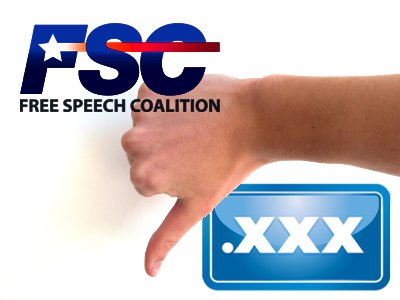Dot-xxx and Intellectual Property: Good for Your Brand, or Bullshit?
[COLOR=red]This is part three of “What’s Wrong with Dot-xxx,” a five-part series outlining the Free Speech Coalition’s assessment of the proposed adult-entertainment-specific sponsored Top Level Domain.[/COLOR]
 By Diane Duke
By Diane Duke
YNOT – At the 2010 Internet Corporation for Assigned Names and Numbers conference in Cartagena, Colombia — some six years after first advancing the dot-xxx sponsored Top Level Domain proposal — ICM Registry finally outlined its plans to protect intellectual property published on dot-xxx domains. The proposal was distributed at a meeting Free Speech Coalition Chairman Jeffrey Douglas and I attended. ICM’s Stuart Lawley also was at that meeting, as was a representative of Valideus Ltd., the entity ICM chose to implement what it calls a “sunrise” rights protection mechanism.
Under the plan, holders of trademarks for existing second-level domain names are afforded certain priorities and other rights. According to the proposal, “The key innovation from ICM will be the opportunity extended to rights owners from outside the adult industry to reserve and therefore block names at the dot-xxx registry so that they cannot be used as conventional web addresses.”
Thus some, but by no means all, trademark holders will be permitted to block all use of their second-level domain names within the dot-xxx sTLD space. At the Cartagena meeting, ICM’s representative, in answer to a specific question, said adult entertainment producers would not be afforded the blocking rights formulated for “rights owners outside the adult industry.” Lawley did not contradict or amend that answer in any way. This limitation on innovative blocking right reveals ICM’s ultimate purpose, which is to coerce all members of the “adult industry” into paying for trademarked second-level domain names they already own and use in other spaces, under threat of losing them to others who will put them to use in the dot-xxx space.
Following the Cartagena meeting, FSC brought extensive attention to bear on the fact that adult businesses that do not support dot-xxx — and by definition are not the “sponsored” community — were being treated differently than their mainstream counterparts. After FSC publicly raised these issues, ICM communicated to FSC that the policy had been misstated in Cartagena.
According to ICM’s website, the policy now says:
[QUOTE]
Sunrise B is for rights owners from outside the sponsored community. Names secured through Sunrise B will not result in the registration of a conventional, resolving domain name at the .xxx registry. Instead, these names will be reserved and blocked from live use. The applied for string will resolve to a standard plain page indicating only that the string is reserved from use through ICM’s rights protection program. It is important to note that members of the Adult Entertainment Industry who do not support .xxx or wish to ever register any names in .xxx will be able to use Sunrise B to apply to block their trademarks. Please note however that any names that have been blocked cannot be unblocked and converted into resolving names without being made generally available. Any entity, applying for blocks under Sunrise B as a non-member of the Sponsored Community cannot apply for names in Sunrise A, C, Landrush or General Availability.
[/QUOTE]
Not so fast. What does this really mean to adult businesses?
If you are among the minority of adult companies that have trademarked a specific brand, you can block it at an estimated minimum cost of $125 per domain, and likely much more. But, you cannot block variations of the name. For example, if Barely Legal is trademarked, BarelyLegal.xxx can be “blocked from live use,” but BarelyLegalGirls.xxx cannot, unless Barely Legal Girls is specifically trademarked. Moreover, if you want to block BarelyLegal.xxx from live use and at the same time defensively register BarelyLegalGirls.xxx, you cannot do so. You’re screwed.
Also, if you want to block your trademarked domains from live use, and at some time in the future change your mind, sorry, you’re screwed again. Your domain will be tossed onto the open market. Sure, there are legal paths you could take, but at what expense to you and your business?
FSC is extremely concerned about how much it will cost established adult entertainment businesses to protect their trademarked brand names and internet traffic should the dot-xxx sTLD be approved. The adult industry has been hit hard by the worldwide recession, and many companies presently lack any excess capital to throw away, especially at $60 per domain per year, just to protect up to thousands of dot-xxx versions of their second-level domain names.
But wait! ICM also is trying to convince us that dot-xxx will, in fact, enhance your brand. In his post of July 8, 2010, Lawley stated that ICM, “WILL be embarking on a multi-million dollar media campaign” to promote the benefits of dot-xxx.
He went on to say, “We will also likely sponsor sporting events, conferences, etc., to make sure that the .XXX brand is fully known prior to the launch and that the general public is fully aware of what .XXX represents.” Sponsoring sporting events? Who is he kidding? The NFL is not going to allow dot-xxx anywhere near its teams. What about baseball? Soccer? These events are for family viewing, and I can promise you they will go nowhere near dot-xxx. But let’s not be too hard on Mr. Lawley. After all, he is not part of the adult industry and knows nothing about it.
ICM is trying to convince us that dot-xxx will enhance adult brands and traffic. But we know better. We say … bullshit!

Throughout March, ICANN’s board of directors plans to discuss some final issues with the internet regulatory body’s Governmental Advisory Committee before determining the next step in dot-xxx’s destiny. It is imperative that adult industry professionals understand the ramifications of this complex issue. In this five-part series, Free Speech Coalition Executive Director Diane Duke points out some of the adult industry trade association’s objections to dot-xxx and explains why owning the organization feels dot-xxx may be dangerous and detrimental to the adult entertainment industry.









